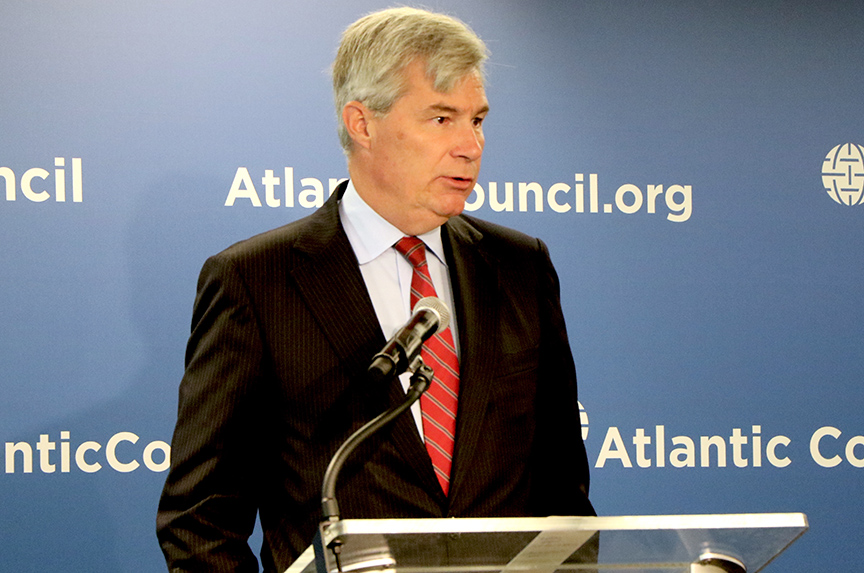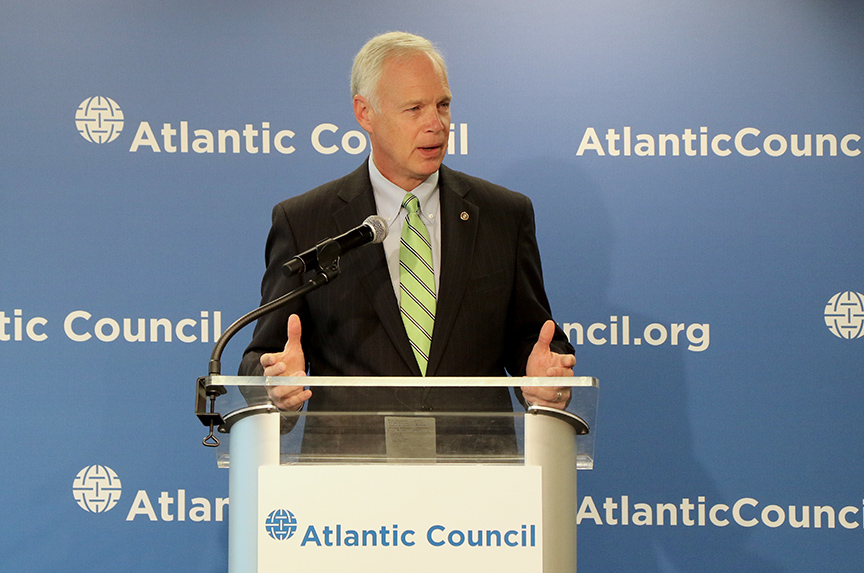 If the United States is to succeed in tackling Russian meddling, it needs to address vulnerabilities—dark money and shell corporations—that are “an open invitation to the Russians to continue their election interference,” US Sen. Sheldon Whitehouse (D-RI) said at the Atlantic Council on September 26.
If the United States is to succeed in tackling Russian meddling, it needs to address vulnerabilities—dark money and shell corporations—that are “an open invitation to the Russians to continue their election interference,” US Sen. Sheldon Whitehouse (D-RI) said at the Atlantic Council on September 26.
The United States faces something of a predicament because dark money and shell corporations are vehicles of not just foreign, but also domestic political influence, Whitehouse said. He and US Sen. Ron Johnson (R-WI) delivered keynote addresses at STRATCOM DC: The First Transatlantic Forum on Strategic Communications and Digital Disinformation in Washington, DC.
Describing opacity as the “vehicle that enables weaponized fake news and politicized corruption,” Whitehouse added: “Transparency and sunlight are the enemies of Russian election interference.”
In January 2010, the US Supreme Court’s Citizens United ruling lifted restrictions on corporate cash in politics. This led to vast sums of money funneled to candidates and causes through shell corporations.
Whitehouse said that it is in the United States’ national security interests to ensure that there is “transparency and daylight” in political spending. This will require disabling the means used by powerful special interests to push their political agenda.
“I don’t know if we are up to that,” said Whitehouse. “This is a test of whether America has gone past a tipping point of special-interest influence.”
Russia has taken advantage of the same vectors of influence that the special interests have exploited. US intelligence agencies concluded that Russia interfered in the 2016 presidential elections in the United States in favor of then Republican candidate Donald J. Trump. The US Congress has conducted multiple hearings on Russian meddling in the US elections and a special counsel, Robert Mueller, is investigating the Kremlin’s involvement with the Trump campaign.
Whitehouse said the vulnerabilities he outlined need to be addressed in order to protect against the Gerasimov Doctrine, an action plan for modern hybrid warfare, which Russia has in recent years employed against many democratic societies. “That is the battle we face and it is, in many respects, the battle for the soul and integrity of our country, and I am sorry to tell you that right now I can’t tell you how it is going to come out,” he said.
The Gerasimov Doctrine gets its name from Gen. Valery Gerasimov—Russia’s chief of the general staff—who in 2013 published an article, “The Value of Science Is in the Foresight.” In that article, Gerasimov, using tactics developed by the Soviets, laid out a form of modern warfare that relies on “nonmilitary means” to attack an adversary’s society. “All this is supplemented by military means of a concealed character,” he wrote.
“The advent of the Gerasimov Doctrine out of Russia has added a new method and a new field of conflict to international warfare—in this case, disinformation warfare,” said Whitehouse.
Opening the conference, Atlantic Council President and Chief Executive Officer, Frederick Kempe, said that the Council is “determined to be on the forefront of this crucially important effort to confront disinformation, fake news, and alternative facts with as broad and as connected a network as we can because we are all in this together.”
While Russia meddled extensively in the French presidential election this spring, it appears to have been less active during the German federal election on September 24.
“Every single expert on this topic has told us, ‘This ain’t over, folks. They did it before, they will do it again.’ Russia actually doesn’t mind being caught; that’s part of the game,” said Whitehouse. “But to be able to identify where their outlets are and to be able to trace them back, that diminishes their power. So, transparency is vital,” he added.
Russian meddling
In his remarks, Johnson, who is the chairman of the US Senate Foreign Relations Committee’s subcommittee on Europe and regional security cooperation, said Russia’s meddling in the US election did not come as a surprise.
“We have seen the destabilizing efforts of Russia throughout Eastern Europe,” he said.
In an effort to prevent Montenegro from joining NATO, Russia financed nationalist parties opposed to Alliance membership and allegedly targeted
the tiny nation’s former prime minister, Milo Djukanovic, in a coup plot hatched by Russian intelligence agents. According to Montenegrin officials, the plotters had planned to seize Montenegro’s Parliament building, kill Djukanovic, and install a pro-Russian government. The plot was uncovered in November 2016. Russia dismissed the allegations as “absurd.” Montenegro joined NATO in June.
Johnson called the events in Montenegro an “act of war.”
“Chaos is cheap. It doesn’t take a whole lot to destabilize, but it takes resources, it takes commitment, it takes cooperation, it takes relationships to provide stability and peace and the opportunity we all want for our fellow citizens,” he said.
He called for a coordinated effort to counter Russia.
Johnson described Southeastern Europe as a “hinge point,” and said it is crucial that Western democracies convey to countries in the region just how important they are to peace and stability.
“If we don’t do that, they start looking to the east when their entire economic future is to the west,” he added.

“It doesn’t take a whole lot to destabilize, but it takes resources, it takes commitment, it takes cooperation, it takes relationships to provide stability and peace and the opportunity we all want for our fellow citizens,” said US Sen. Ron Johnson (R-WI). (Atlantic Council)
NATO’s defense spending
Johnson linked US support for its NATO allies to all Alliance member states meeting the goal of spending 2 percent of their gross domestic product (GDP) on defense. This issue has been a top priority for US President Donald J. Trump, who has chastised US allies for failing to meet this target. So far, just five of NATO’s twenty-nine member states spend 2 percent of their GDP on defense.
“The American taxpayer doesn’t like” that many NATO members don’t meet the two percent target, said Johnson. He said it is crucial for US taxpayers to understand that “NATO will also rise to the threat that Russian aggression poses to our democracies.”
“If you want America’s support to be as steadfast and solid as it has been in the past, you have to show that same level of commitment to your own national defense,” said Johnson. “President Trump isn’t just speaking for himself, he is speaking for the American public.”
Ashish Kumar Sen is deputy director of communications at the Atlantic Council. Follow him on Twitter @AshishSen.
Image: “Transparency and sunlight are the enemies of Russian election interference,” US Sen. Sheldon Whitehouse (D-RI) said at the Atlantic Council in Washington on September 26. He and US Sen. Ron Johnson (R-WI) delivered keynote addresses at “STRATCOM DC: The First Transatlantic Forum on Strategic Communications and Digital Disinformation in Washington, DC.” (Atlantic Council)
